重大高一模块二Unit 6 Making Journeys grammar(共42张PPT)
文档属性
| 名称 | 重大高一模块二Unit 6 Making Journeys grammar(共42张PPT) | 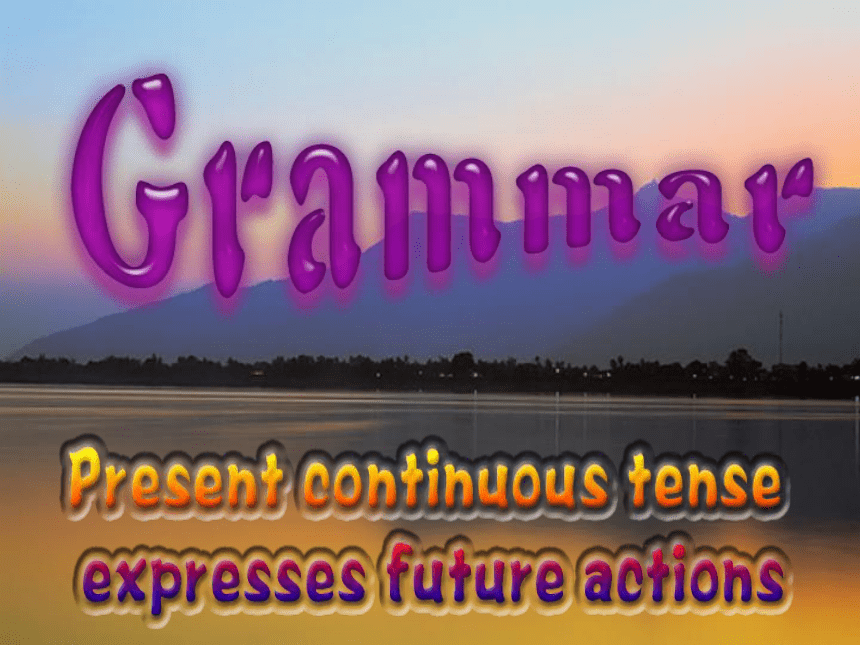 | |
| 格式 | zip | ||
| 文件大小 | 11.8MB | ||
| 资源类型 | 教案 | ||
| 版本资源 | 重庆大学版 | ||
| 科目 | 英语 | ||
| 更新时间 | 2015-02-12 22:47:20 | ||
图片预览

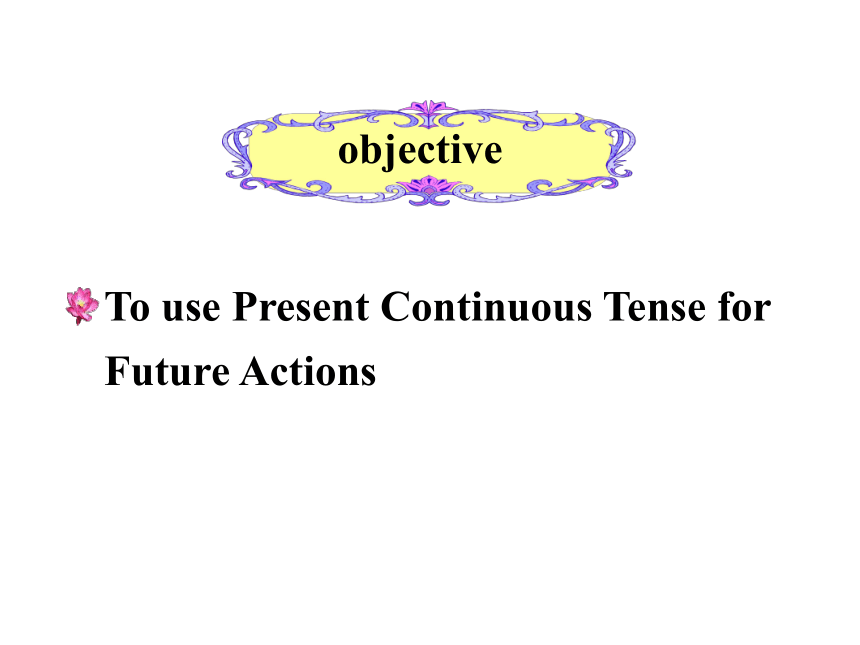
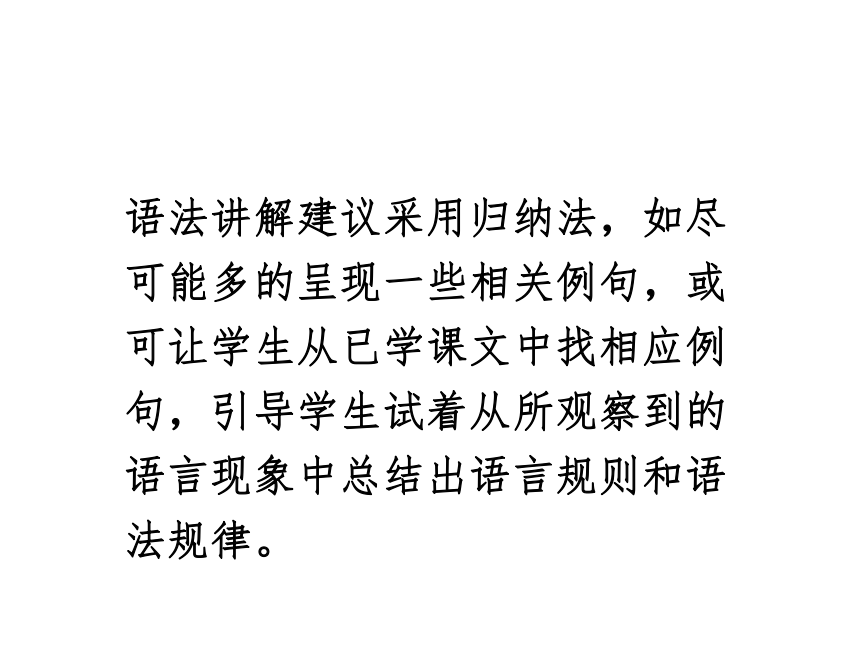
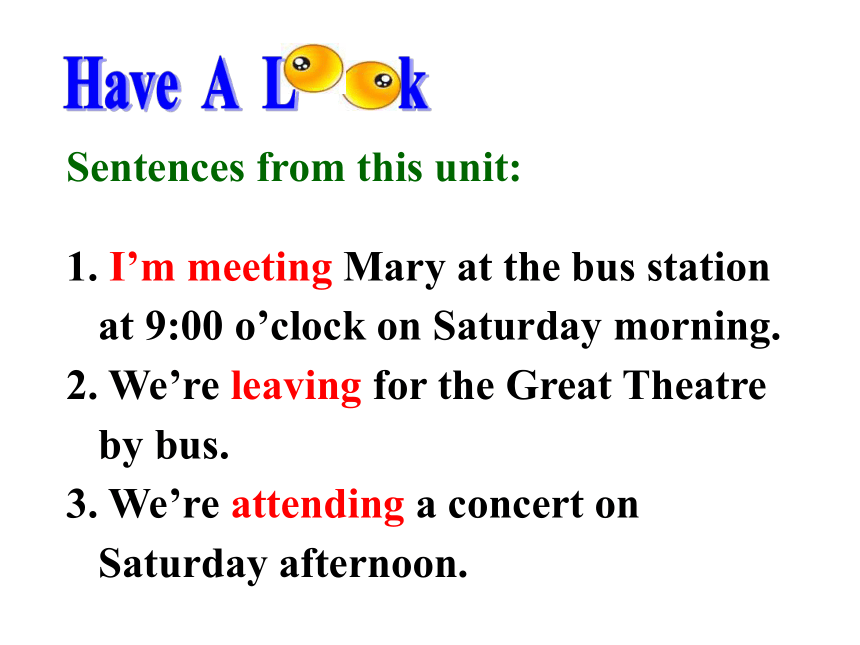

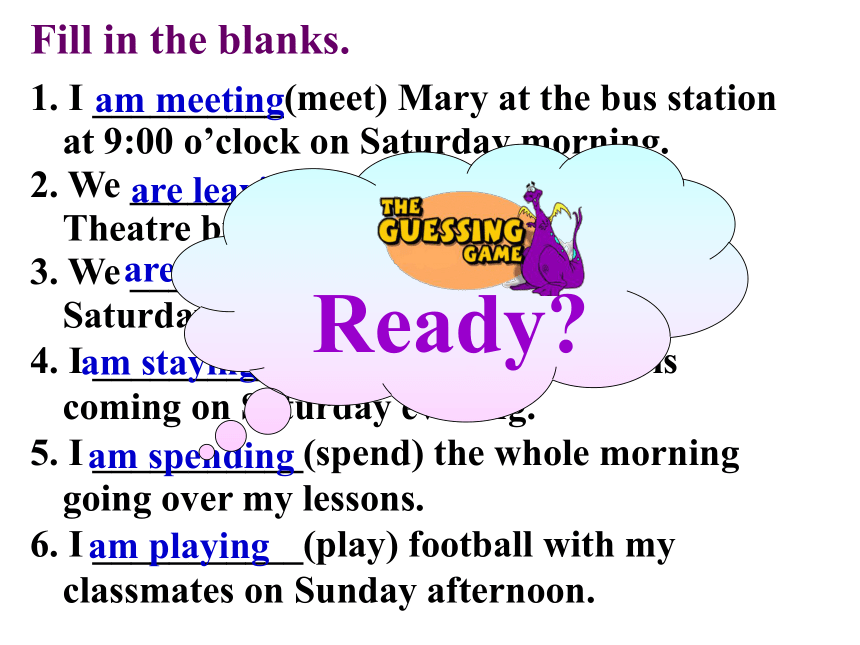
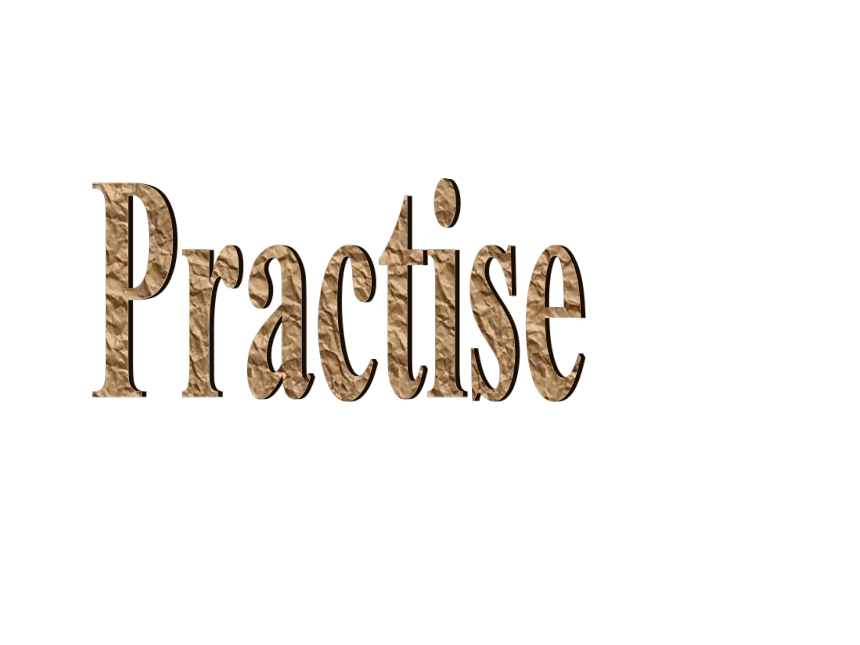
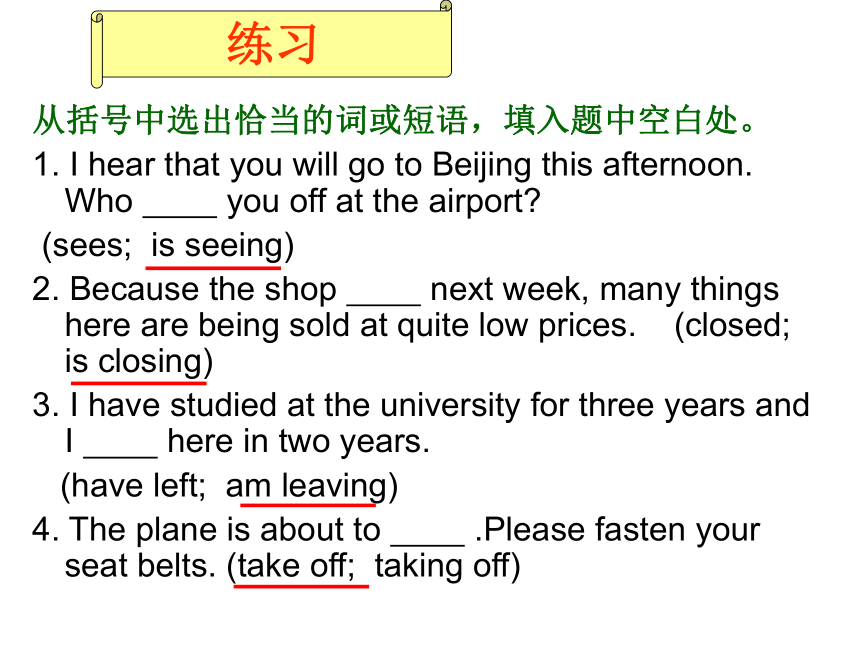
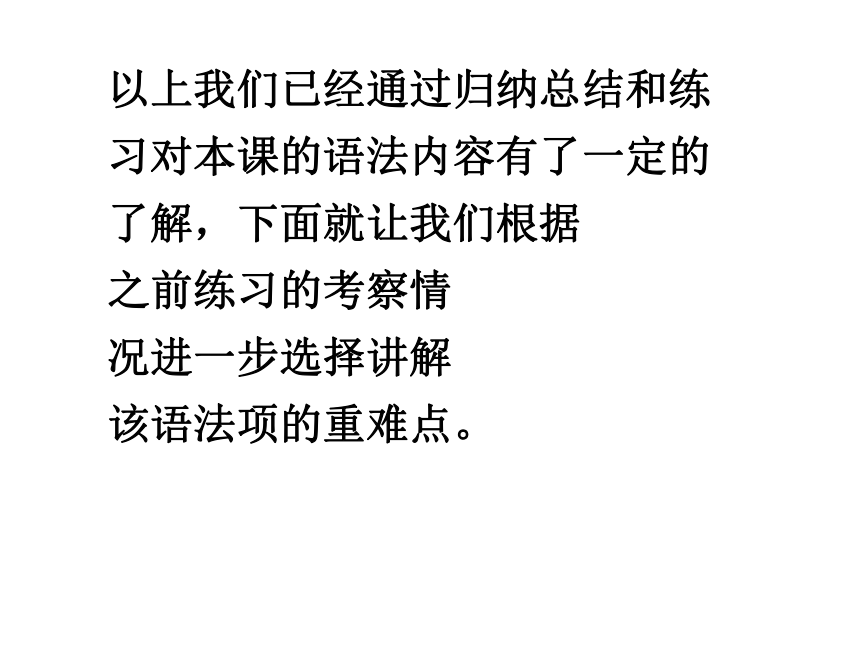
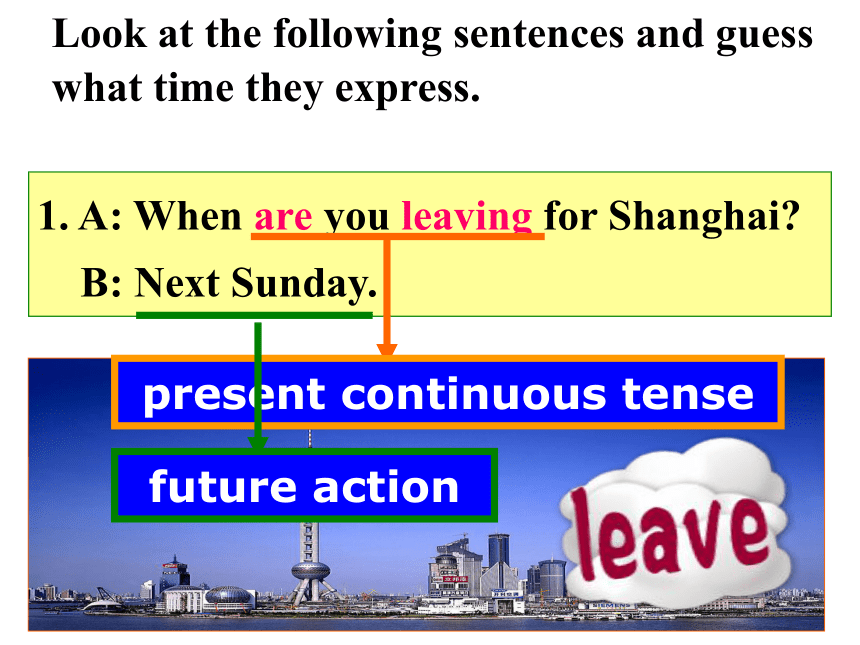
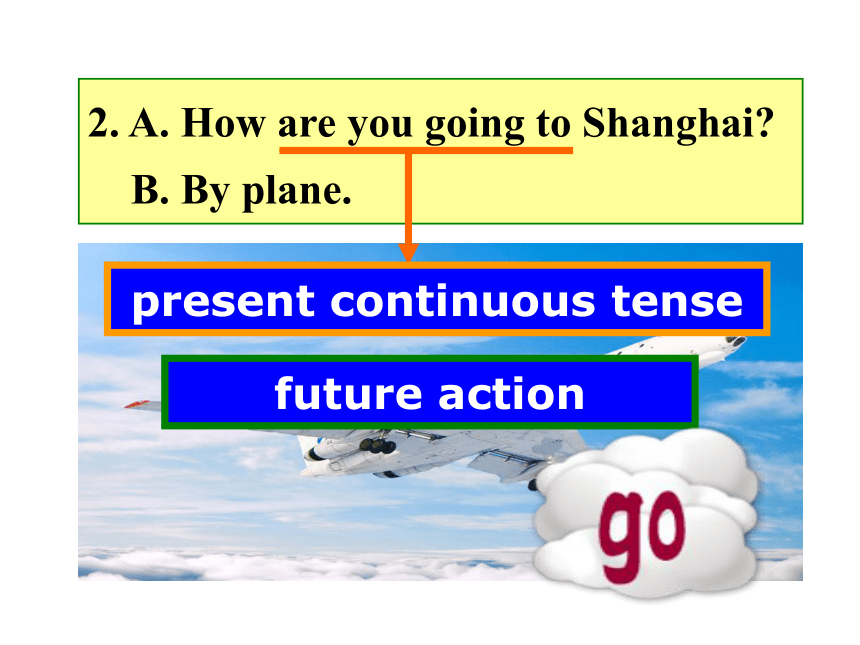
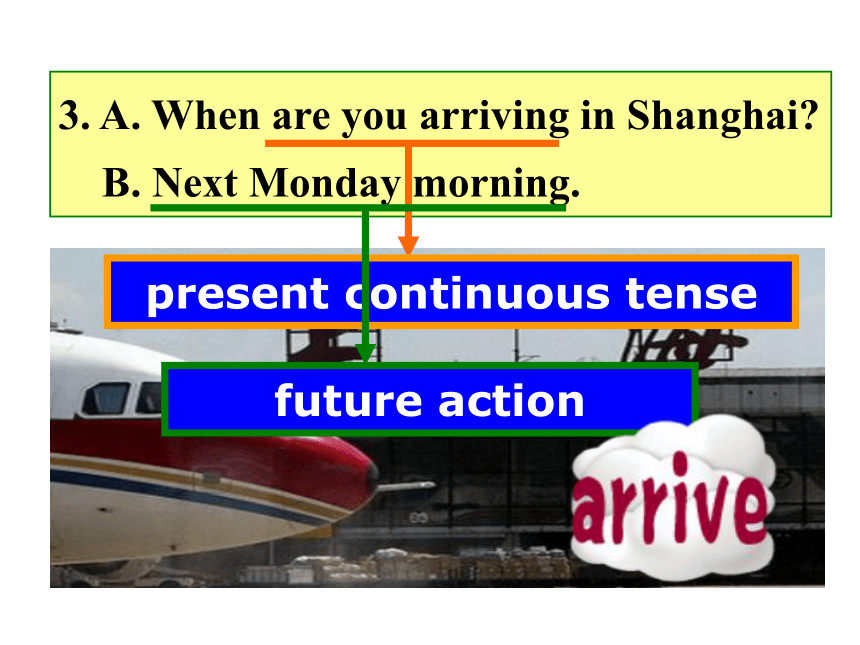
文档简介
课件42张PPT。语法讲解建议采用归纳法,如尽可能多的呈现一些相关例句,或可让学生从已学课文中找相应例句,引导学生试着从所观察到的语言现象中总结出语言规则和语法规律。1. I’m meeting Mary at the bus station at 9:00 o’clock on Saturday morning.
2. We’re leaving for the Great Theatre by bus.
3. We’re attending a concert on Saturday afternoon.Sentences from this unit:4. I’m staying at home, for Jill is coming on Saturday evening.
5. I’m spending the whole morning going over my lessons.
6. I’m playing football with my classmates on Sunday afternoon.Fill in the blanks.1. I __________(meet) Mary at the bus station at 9:00 o’clock on Saturday morning.
2. We __________(leave) for the Great Theatre by bus.
3. We ___________(attend) a concert on Saturday afternoon.
4. I __________(stay) at home, for Jill is coming on Saturday evening.
5. I ___________(spend) the whole morning going over my lessons.
6. I ___________(play) football with my classmates on Sunday afternoon.
am meetingare leavingare attendingam stayingam spendingam playinggo
Ready?Practise从括号中选出恰当的词或短语,填入题中空白处。
1. I hear that you will go to Beijing this afternoon. Who you off at the airport??
(sees; is seeing)
2. Because the shop next week, many things here are being sold at quite low prices.??? (closed; is closing)
3. I have studied at the university for three years and I here in two years.
?? (have left; am leaving)
4. The plane is about to .Please fasten your seat belts. (take off; taking off)练习以上我们已经通过归纳总结和练习对本课的语法内容有了一定的了解,下面就让我们根据
之前练习的考察情
况进一步选择讲解
该语法项的重难点。Look at the following sentences and guess what time they express.present continuous tensefuture actionpresent continuous tensefuture actionpresent continuous tensefuture actionpresent continuous tensefuture actionpresent continuous tensefuture actionpresent continuous tensefuture action1. 现在进行时表示将来通常指的是近期的、按计划或安排要发生的动作,通常带一个表示将来的时间状语,但是如果有明确的上下文时无需指出时间。Summary2. 并非所有的动词都可以用现在进行时表示将来的计划和安排,常见动词有go, come, arrive, fly, start, leave, return, travel, stay, remain等位移动词及do, have, play, work, wear, spend, meet等。1) Annie is coming to have supper this evening.
安妮今晚要来吃晚饭。
2) The guest is leaving by train tonight.
客人今晚坐火车走。
3) I’m meeting you after class.
课后我找你。
4) What are you doing next Sunday?
下星期日你打算干什么?1) 不以主观意志为转移的,_____ 的将 来。
I shall be seventeen years old next month.
2) _____________________。
You go first. I’ll follow you.客观紧接下来要发生的动作即将发生的或最近打算做的事。
We are going to have a meeting today.主 观
打 算计划、安排、义务、应该、可能、命运。1. His daughter is to get married soon. 2. No one is to leave the building. 3. They said goodbye, little knowing they were never to meet again._________ 的动作, 不与表示将来的时间状语连用。
I ________________ swimming when my guide shouted at me and told me not to do so. 我正要去游泳, 这时向导大声叫我不要去。即将发生was about to go(1) come, go, leave, move, start, return, arrive, begin, stay等动词表示的是 ____,_____ 等 _______ 时,用一般现在时表将来。
The plane ________ at 10:10. That is, it’s leaving in ten minutes.航班轮船时间表takes off(2) 用在 __________ 中用一般现在时代替将来时。
If you ___ that again, I’ll hit you.(3) 用在 _____ 和 ______ 后面, 常用一般现在时表将来。
I bet you ____________ before ten tomorrow.
我敢说你明天不到10点是不会起床的。状语从句doI betI hopedon’t get upYou have got some plans for the future. Use the present continuous tense to express your future actions. Give as much information as you can.EXAMPLE: this eveningI’m going out this evening.
I’m not doing anything this evening.
I don’t know what I’m doing this evening.1. I am staying at home next Monday. 2. … meeting my friends … 3. … travelling to Japan … 4. … … creativeHow are you spending the Christmas?When are you getting there?
Where are you going?
Where are you staying …?
How much are you spending on it?
What are you taking with you for the party?
How long are you staying in…?
What are you doing there?
Who are you inviting ?
When are you coming back?...We are having a Christmas party.Plan for the Christmas Party in groups, using the Present Continuous Tense for Future Actions.go get to arrive come leave invite start sleep stay return play do have take a boat work wear wait spend see see off visit meet 注:另附word文档,点此链接1. Ladies and gentlemen, please fasten your seat belts. The plane________.(2010 福建)
takes off B. is taking off
C. has taken off D. took offI. Multiple choice2. My friend, who has served on the International Olympic Committee all his life, is _______ next month.(2010 浙江)
A. retire B. retired C. had retired D. retiring3. ----We’ve spent too much money recently.
----Well, it isn’t surprising. Our friends and relatives ______ around all the time.(2011 上海)
are coming
B. had come
C. were coming
D. have been coming 4.Selecting a mobile phone for personal use is no easy task because technology_____ so rapidly. (2011 全国)
A. is changing
B. has changed
C. will have changed
D. will change 1. 火车就要进站了。
2. 他们下个月结婚。
3. 他们今天下午动身去香港。
4. 课后我找你。
5. 我长大了要参军。
6. 你什么时候动身?II: Translation.1. The train is arriving soon.2. They’re getting married next month. 3. They’re leaving for Hong Kong this afternoon.4. I’m meeting you after class. 5. When I grow up, I’m joining the army. 6. When are you starting? Quiz III: 阅读下面的短文,在空白处填入 适当内容(不多于3个单词)或
括号内单词的正确形式。 At a village fair, I decided to visit a fortune-teller ______ (call) Madam Bellinsky. I went into her tent and she told me _____ (sit) down. After I had given her some money, she looked into a crystal ball and said: 'A relation of yours _________ (come) to see you. She will be arriving this evening and intends to stay ___ a few days. calledto sitis comingforThe moment you leave this tent, you will get a big _______ (surprising). A woman you know well will rush _______ you. She will speak to you and then she will lead you away from this place. That is all.'
As soon as I went outside, I forgot all about Madam Bellinsky _______ my wife hurried towards me. 'Where have you been hiding?' she asked __________ (patient). 'Your sister ______ here in less than ___ hour and we must be at the station to meet her. We are late already.' As she walked away, I followed her out of the fair. surprisetowardsbecauseimpatientlyanwill beReview 现在进行时表示将来的计划和安排,
常见动词有go, come, arrive, fly,
start, leaveHomeworkDo the exercises on page 83.PreviewLearn the new words of Listening & Speaking.
2. We’re leaving for the Great Theatre by bus.
3. We’re attending a concert on Saturday afternoon.Sentences from this unit:4. I’m staying at home, for Jill is coming on Saturday evening.
5. I’m spending the whole morning going over my lessons.
6. I’m playing football with my classmates on Sunday afternoon.Fill in the blanks.1. I __________(meet) Mary at the bus station at 9:00 o’clock on Saturday morning.
2. We __________(leave) for the Great Theatre by bus.
3. We ___________(attend) a concert on Saturday afternoon.
4. I __________(stay) at home, for Jill is coming on Saturday evening.
5. I ___________(spend) the whole morning going over my lessons.
6. I ___________(play) football with my classmates on Sunday afternoon.
am meetingare leavingare attendingam stayingam spendingam playinggo
Ready?Practise从括号中选出恰当的词或短语,填入题中空白处。
1. I hear that you will go to Beijing this afternoon. Who you off at the airport??
(sees; is seeing)
2. Because the shop next week, many things here are being sold at quite low prices.??? (closed; is closing)
3. I have studied at the university for three years and I here in two years.
?? (have left; am leaving)
4. The plane is about to .Please fasten your seat belts. (take off; taking off)练习以上我们已经通过归纳总结和练习对本课的语法内容有了一定的了解,下面就让我们根据
之前练习的考察情
况进一步选择讲解
该语法项的重难点。Look at the following sentences and guess what time they express.present continuous tensefuture actionpresent continuous tensefuture actionpresent continuous tensefuture actionpresent continuous tensefuture actionpresent continuous tensefuture actionpresent continuous tensefuture action1. 现在进行时表示将来通常指的是近期的、按计划或安排要发生的动作,通常带一个表示将来的时间状语,但是如果有明确的上下文时无需指出时间。Summary2. 并非所有的动词都可以用现在进行时表示将来的计划和安排,常见动词有go, come, arrive, fly, start, leave, return, travel, stay, remain等位移动词及do, have, play, work, wear, spend, meet等。1) Annie is coming to have supper this evening.
安妮今晚要来吃晚饭。
2) The guest is leaving by train tonight.
客人今晚坐火车走。
3) I’m meeting you after class.
课后我找你。
4) What are you doing next Sunday?
下星期日你打算干什么?1) 不以主观意志为转移的,_____ 的将 来。
I shall be seventeen years old next month.
2) _____________________。
You go first. I’ll follow you.客观紧接下来要发生的动作即将发生的或最近打算做的事。
We are going to have a meeting today.主 观
打 算计划、安排、义务、应该、可能、命运。1. His daughter is to get married soon. 2. No one is to leave the building. 3. They said goodbye, little knowing they were never to meet again._________ 的动作, 不与表示将来的时间状语连用。
I ________________ swimming when my guide shouted at me and told me not to do so. 我正要去游泳, 这时向导大声叫我不要去。即将发生was about to go(1) come, go, leave, move, start, return, arrive, begin, stay等动词表示的是 ____,_____ 等 _______ 时,用一般现在时表将来。
The plane ________ at 10:10. That is, it’s leaving in ten minutes.航班轮船时间表takes off(2) 用在 __________ 中用一般现在时代替将来时。
If you ___ that again, I’ll hit you.(3) 用在 _____ 和 ______ 后面, 常用一般现在时表将来。
I bet you ____________ before ten tomorrow.
我敢说你明天不到10点是不会起床的。状语从句doI betI hopedon’t get upYou have got some plans for the future. Use the present continuous tense to express your future actions. Give as much information as you can.EXAMPLE: this eveningI’m going out this evening.
I’m not doing anything this evening.
I don’t know what I’m doing this evening.1. I am staying at home next Monday. 2. … meeting my friends … 3. … travelling to Japan … 4. … … creativeHow are you spending the Christmas?When are you getting there?
Where are you going?
Where are you staying …?
How much are you spending on it?
What are you taking with you for the party?
How long are you staying in…?
What are you doing there?
Who are you inviting ?
When are you coming back?...We are having a Christmas party.Plan for the Christmas Party in groups, using the Present Continuous Tense for Future Actions.go get to arrive come leave invite start sleep stay return play do have take a boat work wear wait spend see see off visit meet 注:另附word文档,点此链接1. Ladies and gentlemen, please fasten your seat belts. The plane________.(2010 福建)
takes off B. is taking off
C. has taken off D. took offI. Multiple choice2. My friend, who has served on the International Olympic Committee all his life, is _______ next month.(2010 浙江)
A. retire B. retired C. had retired D. retiring3. ----We’ve spent too much money recently.
----Well, it isn’t surprising. Our friends and relatives ______ around all the time.(2011 上海)
are coming
B. had come
C. were coming
D. have been coming 4.Selecting a mobile phone for personal use is no easy task because technology_____ so rapidly. (2011 全国)
A. is changing
B. has changed
C. will have changed
D. will change 1. 火车就要进站了。
2. 他们下个月结婚。
3. 他们今天下午动身去香港。
4. 课后我找你。
5. 我长大了要参军。
6. 你什么时候动身?II: Translation.1. The train is arriving soon.2. They’re getting married next month. 3. They’re leaving for Hong Kong this afternoon.4. I’m meeting you after class. 5. When I grow up, I’m joining the army. 6. When are you starting? Quiz III: 阅读下面的短文,在空白处填入 适当内容(不多于3个单词)或
括号内单词的正确形式。 At a village fair, I decided to visit a fortune-teller ______ (call) Madam Bellinsky. I went into her tent and she told me _____ (sit) down. After I had given her some money, she looked into a crystal ball and said: 'A relation of yours _________ (come) to see you. She will be arriving this evening and intends to stay ___ a few days. calledto sitis comingforThe moment you leave this tent, you will get a big _______ (surprising). A woman you know well will rush _______ you. She will speak to you and then she will lead you away from this place. That is all.'
As soon as I went outside, I forgot all about Madam Bellinsky _______ my wife hurried towards me. 'Where have you been hiding?' she asked __________ (patient). 'Your sister ______ here in less than ___ hour and we must be at the station to meet her. We are late already.' As she walked away, I followed her out of the fair. surprisetowardsbecauseimpatientlyanwill beReview 现在进行时表示将来的计划和安排,
常见动词有go, come, arrive, fly,
start, leaveHomeworkDo the exercises on page 83.PreviewLearn the new words of Listening & Speaking.
